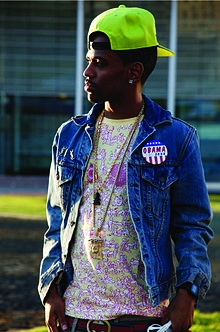You have /5 articles left.
Sign up for a free account or log in.

Big Sean
Wikipedia
This article contains explicit and potentially offensive terms that are essential to reporting on this situation.
Should music that plays to stereotypes be condemned? Should musicians who do so be hired to perform at universities? Should standards for condemning music be similar for work that offends for promoting racist stereotypes and music that demeans women or gay people?
These are some of the questions that have surfaced at Princeton University in the last week. A video of a performance of Urban Congo, a student group, prompted widespread condemnation for seeming to make fun of Africans, and the organization quickly disbanded, apologizing for the offense it caused. But at the same time, the university is preparing to welcome the rapper Big Sean to campus for a party that is a highlight of the spring semester. Many consider his lyrics to be sexist and vile (while plenty of fans have made him a star). So far, the university is not calling off his appearance. Many students are asking about what seems to be a contradiction in the responses to various kinds of offensive music.
The performance of Urban Congo shows a group of apparently white male students, clad in bathing suits, performing before other students (who from the sound appear to enjoy the show) by beating on trash cans and their stomachs in some sort of faux native tradition.
As video of the event circulated, many said it mocked Africans (or others), while others questioned just what was meant by the name Urban Congo.
The group didn't defend itself, but shut itself down. On Facebook, Michael Hauss, who had been president of the group, posted two notes of apology. The second said, in part: "I have never considered myself an insensitive person but am now deeply upset by the reality of my actions. Urban Congo did not intend to offend any person or culture. We wanted to provide an environment in which all students could relieve stress and develop relationships through spontaneous, unprocessed percussion. I am embarrassed that my ignorance extended so far as to equate the words 'conga' and 'bongo' with 'Congo.' We are mortified that our desire to convey the primal nature of our beats enabled us to overlook the cultural implications of our performances. But intent is not what is important now. In ignorance we created something undeniably offensive."
Against this backdrop, some students started to question the selection of Big Sean and a petition has urged the Undergraduate Student Government to revoke the invitation (something the student government leaders say that they can't do because contracts have been signed).
Many have noted in particular the lyrics to the Big Sean hit "I Don't Fuck With You," which includes references to a woman as a "stupid-ass bitch." Others have noted that it is more difficult to view these lyrics as words alone when Big Sean in 2011 agreed to a deal in which he entered a guilty plea to a charge of unlawful imprisonment in return for the dropping of charges of forcible touching and third-degree sex abuse. The charges came from a 17-year-old girl who said she was sexually assaulted by Big Sean and another rapper at a concert. Big Sean denied any sexual misconduct.
Big Sean was the headliner at Columbia University's spring concert this year -- and some there found it ironic or offensive that a university that has faced so much scrutiny over whether it takes violence against women seriously would invite him. A student satire, noting that Columbia is moving to a new requirement that students participate in "sexual respect" education or produce artwork on that theme, imagined Big Sean being forced to participate and then fulfilling the requirement through the song attracting so much criticism. Many students, it should be noted, flocked to the performance, and complained only about not being able to be close enough to the stage.
Duncan Hosie, one of the Princeton students who organized the petition against Big Sean, has distributed lyrics to other Big Sean songs, in which he uses the word "faggot," repeatedly uses the word "ho" to describe women and repeatedly refers to his right to have sex with them. "We do not want our tuition fees to be used in support of something we find morally and ethically reprehensible," said the email distributed by critics of Big Sean. "We understand that this position may be unpopular. Indeed, most students are excited about Big Sean’s selection. Yet we challenge Princeton to think about how passive acceptance of misogyny and homophobia creates injustice."
The video that follows shows the song "I Don't Fuck With You," but those offended by such lyrics may want to skip to the rest of the article.
Christopher Eisgruber, Princeton's president, called a town hall-style meeting on Sunday, sending a campuswide email about the two debates over music performances. "Our campus community is in the midst of two impassioned debates about the impact and limits of stage performances," he said. "One debate pertains to the moral culpability of a now-defunct student group, Urban Congo, a group whose performances were described by its own president as 'inexcusably offensive.' The group has apologized and disbanded. The second debate addresses the Undergraduate Student Government’s invitation to Big Sean, a rapper whose songs include lyrics that are vile and demeaning to women and L.G.B.T. individuals."
Eisgruber noted that just last week, the university's faculty approved a resolution affirming that “the university’s fundamental commitment is to the principle that debate or deliberation may not be suppressed because the ideas put forth are thought by some or even by most members of the university community to be offensive, unwise, immoral or wrongheaded."
But while remaining true to free expression, Eisgruber said, students at Princeton should also think about other responsibilities as divisive issues are discussed, particularly on social media. "We owe it to ourselves to do better, to be better and to embrace all the members of our community with respect and with genuine appreciation for the perspectives they bring. We must treat individuals, groups and cultures with the dignity they deserve; we must not traffic in stereotypes. I accordingly implore all of the Princeton community to live up to our ideals, to recognize the pain being felt by some members of our community and to express ourselves in the veiled and dehumanized precincts of social media with the same care that we should bring to more personal interactions."




